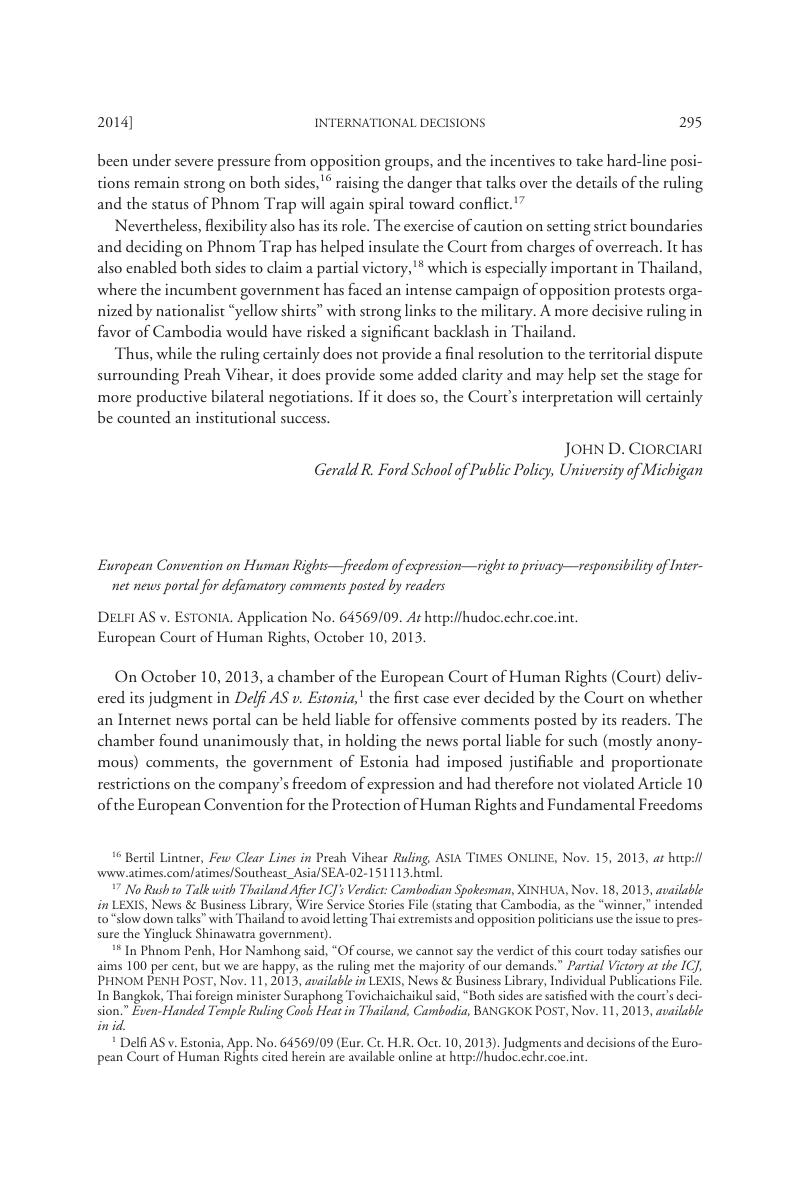Published online by Cambridge University Press: 20 January 2017

1 Delfi AS v. Estonia, App. No. 64569/09 (Eur. Ct. H.R. Oct. 10, 2013). Judgments and decisions of the European Court of Human Rights cited herein are available online at http://hudoc.echr.coe.int.
2 Convention for the Protection of Human Rights and Fundamental Freedoms, Art. 10, Nov. 4, 1950, ETS No. 5, 213 UNTS 222 [hereinafter Convention]. Article 10(1) provides: “Everyone has the right to freedom of expression. This right shall include freedom to hold opinions and to receive and impart information and ideas without interference by public authority and regardless of frontiers. This Article shall not prevent States from requiring the licensing of broadcasting, television or cinema enterprises.”
3 The Freedom on the Net 2013 index, published by Freedom House, ranked Estonia second after Iceland in the global context. See Freedom House, 2013 Global Scores, at http://www.freedomhouse.org/report/freedom-net2013-global-scores#.UvpVxfldXul. The Press Freedom Index ranked Estonia in eleventh place for 2013. See Reporters Without Borders, Press Freedom Index 2013, at http://en.rsf.org/press-freedom-index-2013,1054.html.
4 Article 10(2) of the Convention, supra note 2, reads in pertinent part: “The exercise of these freedoms, since it carries with it duties and responsibilities, may be subject to such formalities, conditions, restrictions or penalties as are prescribed by law and are necessary in a democratic society....”
5 Garnett, Jennifer, European Court Finds Liability for Defamatory Comments by Anonymous Users, Harv. J.L. & Tech. Dig. (Oct. 19, 2013)Google Scholar, at http://jolt.law.harvard.edu/digest/jurisdiction/international-decisions/europeancourt-finds-liability-for-defamatory-comments-by-anonymous-users.
6 Quoted in id.; see also Zara, Christopher, Websites Liable for Anonymous Comments? European Court Upholds Defamation Case Against Estonian News Portal, Int’l Bus. Times, Oct. 11, 2013 Google Scholar, at http://www.ibtimes.com (search “delfi”).
7 Times Newspapers Ltd. v. United Kingdom (Nos. 1 and 2), 2009-I Eur. Ct. H.R. 377, paras. 20, 21, 38 [hereinafter Times Newspapers ] (citing Duke of Brunswick v. Harmer, (1849) 117 Eng. Rep. 75, [1849] 14 Q.B. 185).
8 Kononov v. Latvia, App. No. 36376/04, para. 237 (Eur. Ct. H.R. May 17, 2010) (Grand Chamber).
9 Soros v. France, App. No. 50425/06, paras. 59–62 (Eur. Ct. H.R. Oct. 6, 2011) (in French).
10 Citing, e.g., Joined Cases C-236/08 –C-238/08, Google France SARL v. Louis Vuitton Malletier SA, 2010 ECR I-2417 (Grand Chamber).
11 Directive 2000/31, of the European Parliament and of the Council on Electronic Commerce, 2000 O.J. (L 178) 1; Directive 98/34, of the European Parliament and of the Council Laying down a Procedure for the Provision of Information in the Field of Technical Standards and Regulations, 1998 O.J. (L204) 37, as amended by Parliament and Council Directive 98/48, 1998 O.J. (L 217) 18.
12 McIntyre v. Ohio Elections Comm’n, 514 U.S. 334, 363–64 (1995).
13 Reno v. ACLU, 521 U.S. 844, 870 (1997).
14 Rychlak, Ronald J., Compassion, Hatred, and Free Expression, 27 Miss. C. L. Rev. 407, 424 –25 (2008)Google Scholar.
15 Bowcott, Owen, Bill Targeting Internet ‘Trolls’ Gets Wary Welcome from Websites, Guardian Unlimited, June 12, 2012 Google Scholar, available in LEXIS, News & Business Library, Non-US Newspapers and Wires File.
16 Times Newspapers, supra note 7; Editorial Board of Pravoye Delo v. Ukraine, App. No. 33014/05 (Eur. Ct. H.R. May 5, 2011); We˛grzynowski v. Poland, App. No. 33846/07 (Eur. Ct. H.R. July 16, 2013).
17 Quoting Editorial Board of Pravoye Delo, para. 63, quoted in W˛egrzynowski, para. 58.
18 Quoting id., quoted in W˛egrzynowski, para. 58.
19 Susi, Mart, The Definition of a ‘Structural Problem’ in the Case-Law of the European Court of Human Rights Since 2010, 2012 Ger. Y.B. Int’l L. 385 Google Scholar.